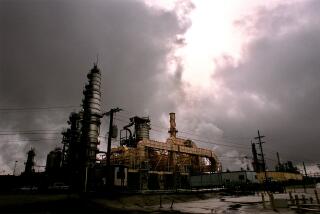U.S. Inventories Down : Oil Prices Soar Amid Talk of Lower OPEC Production
- Share via
Amid signs of tightened production in the Middle East and slimmer oil inventories in the United States, the price of crude oil posted its sharpest gain in a year on Tuesday. The surge wiped out much of the decline triggered by last week’s OPEC meeting.
U.S. crude for delivery in February jumped $1.21 to $16.61 a barrel on the New York Mercantile Exchange. On the spot market, the U.S. benchmark crude called West Texas Intermediate climbed 45 cents to $17.06 a barrel.
The big gains followed reports of sharply lower oil production by three of OPEC’s biggest quota violators, a strong statement by OPEC President Rilwanu Lukman of Nigeria and news that U.S. crude oil inventories fell nearly 5.2 million barrels last week.
The Middle East Economic Survey, a Cyprus-based publication with close ties to Saudi Arabia, reported that Kuwait, the United Arab Emirates and Iraq have taken steps to immediately trim their oil production.
Overproduction by those nations in the second half of 1987 has weakened oil prices and undermined OPEC’s credibility. When the cartel failed at its meeting in Vienna to take concrete action to curb overproduction, prices plummeted by more than $2 a barrel.
The newsletter said authorities in the UAE have ordered a January cutback of 350,000 barrels a day, while Kuwait and Iraq were showing “some degree of restraint” in the wake of the steep price decline which followed the Vienna meeting.
‘No More Cheating’
Senior marketing officials at Kuwait Petroleum Corp were said to have been told by Oil Minister Sheikh Ali al-Khalifa al-Sabah to bring output down to its quota level by the beginning of January. Al-Sabah said recently that Kuwait has been producing 100,000 to 150,000 barrels per day above its quota.
“We are not going to cheat anymore,” Lukman declared Tuesday in London. “This is more than wishful thinking. People have realized that, if they don’t stick by the agreement, prices will collapse.”
OPEC leaders have made such statements before, and some traders expected the gains to be short-lived.
“Gulf countries have a long way to go before the market develops confidence in them as far as output discipline goes,” one industry executive in the Middle East said.
But an oil trader said, “Last week, talk was of netback (discount) deals. This week we are asking where the evidence is.”
Some traders said that the inventory statistics from the American Petroleum Institute did not in themselves warrant such a sharp rise but that much of the upturn stems from news that some OPEC members would be cutting production.
Prices weren’t hurt, either, by dispatches from the Persian Gulf that said Iraqi warplanes bombed and set ablaze three supertankers in a raid on a major Iranian oil terminal. There was no immediate confirmation of the attacks, but anxiety over the tanker war in the Gulf has been one of the few underpinnings of oil prices in recent months.
Brent blend, the most widely traded North Sea crude, was quoted Tuesday at $17.00 a barrel in late trading, up $1.80 from Monday.
The crude oil price rise pushed up prices for petroleum products. The spot January heating oil contract rose 2.62 cents to 51.97 cents a gallon, while gasoline for delivery in January jumped 2.88 cents to 44.16 cents a gallon.
More to Read
Sign up for Essential California
The most important California stories and recommendations in your inbox every morning.
You may occasionally receive promotional content from the Los Angeles Times.













